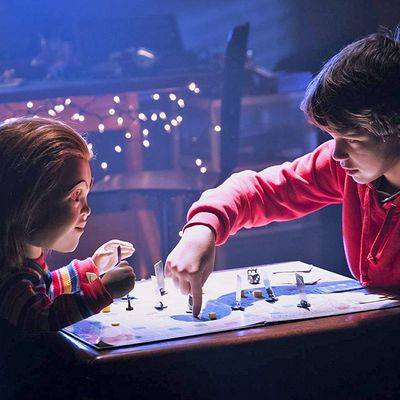
Child’s Play, the new slasher reboot of the Chucky franchise, directed by Lars Klevberg, half works. Garish Christmas lights and drones equipped with razors — both of which feature in the film as fantastic weaponry — are amusing, but they’re only as effective as the limp horror story around it. Unfortunately, Child’s Play is undone by a lack of tension even its best performances can’t conjure, and a familiar story that only skips lightly along the surface of gnarly ideas.
In 2019, Aubrey Plaza plays Karen Barclay, the young mom to Andy (13-year-old Gabriel Bateman of Annabelle and Lights Out fame), who by chance receives an AI-equipped Buddi doll after the defective toy is returned to his mother’s store. Due to a settings glitch, Chucky’s contemporary incarnation (voiced by a cutesy-creepy Mark Hamill, who has done better voice work elsewhere) eventually goes the way of his predecessor, wreaking widespread havoc — just with a lot less panache. Brian Tyree Henry plays the cop swept up in it all; his mother lives in the same apartment building as the Barclays, where the murders keep piling up.
Even as Chucky’s inexplicable death plot roiled on, I couldn’t help but be charmed by the cast’s spunky line readings — like early on, when Plaza, with mock insouciance, jokes about being a juvenile mother: “I had a very productive sweet sixteen.” But Tyler Burton Smith’s script hardly challenges either of the adult actors, both of whom have proven to be magnetic performers adept at comedy and drama. Suspense is nowhere to be found in this screenplay. Instead, we’re left to be amused by the predictably placed (albeit intermittently creative) kills that litter the tale. A table saw to the groin is comeuppance for one particularly lecherous handyman.
In taking the franchise away from creator Don Mancini — as well as actor Brad Dourif, who brought menace and humor to the role of Charles Lee Ray — the Child’s Play reboot loses the impish spark that made it so strangely delightful. I must admit I have a fondness for the original Chucky films, including straight-to-video works like the cruel Cult of Chucky. They’re funny, with an odd sense of self-awareness. As writer Scott Tobias pointed out to me at a recent screening, the franchise has effectively shifted from slasher flicks to referential campy romps, always reflecting the moment of horror surrounding it. (Bride of Chucky rode the Scream zeitgeist well.) The Chucky stories are, after all, about a pint-size doll possessed by the spirit of a Chicago-area serial killer.
This year’s Child’s Play does away with that storyline, though, creating a framing device with some knotted connotations. Here, a disgruntled and abused worker in a Vietnamese factory owned by Kaslan — the Amazon-esque juggernaut that makes the Buddi dolls — decides, as a form of retribution, to turn off the safety protocols on a particular Buddi. Of course, it goes on to become the murderously devoted smart toy at the heart of the film. Chucky no longer has to rely on the wit of a human or a simple blade to off his targets. In 2019, AI Chucky can connect to all Kaslan devices — drones, automated cars, the thermostat, televisions, and much more — making his abilities grand and ill-defined.
There is an intriguing idea nestled within the film: How does our relationship to technology harm us? Early moments in the movie reveal that Andy is an exceedingly lonely child in a new city. (As a result, the bulk of the action in Child’s Play is contained to his apartment building.) When his mother totes home that discarded Buddi doll, after some initial wariness it becomes his catch-all companion, standing in for the friendships he doesn’t have. With a bit more exploration and more confident style, the story could have acted as an intriguing parallel to how younger generations are being raised today, and the wider ways in which technology can emptily replace human contact. But the film is either too timid or too uninterested in this bleak reality to explore it fully. Unfortunately, that Chucky is now a soulless automaton is an apt metaphor for the film itself.


